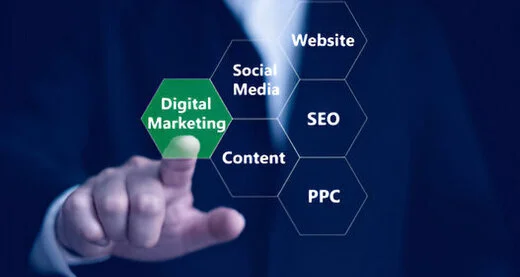Digital marketing is a field that is always changing and where new ideas are king. As we enter 2024, businesses must adapt to remain relevant in a world where new technologies are emerging and customer habits are evolving.
Knowing the newest trends can make a huge difference for your brand, from how to use social media to how to use search engines.
There are so many sites that want your attention that it can be hard to figure out what works and what doesn’t. Don’t worry, though! Smart marketers can’t pass up the exciting chances that come up this year.
look at the digital marketing trends that will shape 2024 and learn how you can use them to your advantage.
The Importance of Keeping Up with Trends
The digital terrain changes far too quickly. Something that worked yesterday might not be so tomorrow. Success in digital marketing depends on being current with trends.
Ignoring these changes might let companies fall behind. First attracted to competitors who adapt and innovate will be potential consumers. This dynamic environment calls for both response and adaptability.
Trends mirror consumer behavior, tastes, and technical development. Monitoring developing trends can help you to properly adjust your plans to satisfy the expectations of the audience.
Constant information upgrading helps you to maximize campaigns. It enables the identification of fresh prospects fit for consumer preferences or changes in the market.
Being proactive distinguishes you from others in the field in a society when change is the only constant. Adopting trends helps your brand to flourish and establishes your leadership rather than following.
Top 5 Digital Marketing Trends for 2024

The world of digital marketing is changing very quickly. As we move into the year 2024, it’s important to keep up with the latest trends.
The first is personalized content that you can connect with. Individuals seek experiences customized to their interests. Quizzes and interactive videos are excellent ways to get people to connect with your content.
Added reality (AR) and virtual reality (VR) are next on the list. These technologies offer immersive experiences that bring goods to life and let people imagine how they would look in real life.
This year, voice search optimization is also very important. Making material more suitable for natural language queries will increase its visibility and enhance the user experience as more people use voice assistants.
Then there’s AI, which is changing the way marketers do their jobs. AI tools quickly look at data, which helps brands make smart choices and improves relationships with customers.
Influencer marketing keeps going in the right direction. Working together with real influencers is still a powerful way to reach your objective viewers.
Personalized and Interactive Content
Personalized and interactive content is transforming digital marketing. Customers desire experiences that cater to their preferences. This trend enables brands to engage customers at a deeper level.
Interactive quizzes, surveys, and personalized suggestions encourage debate rather than monologue. When users feel engaged, they are more likely to recall the brand.
Furthermore, using user data allows you to present relevant information that is tailored to the interests of your target audience. Tailoring messaging increases engagement dramatically.
Consider how Netflix recommends episodes based on viewing history and Spotify curates tracks based on individual preferences. These examples demonstrate the effectiveness of personalization in creating memorable interactions.
As customers grow accustomed to this type of material, businesses must adjust swiftly. Brands that do not adopt this strategy risk falling behind in a fast-paced digital market that values connection and engagement over simply visibility.
Augmented Reality and Virtual Reality in Marketing

Virtual reality (VR) and augmented reality (AR) are significantly altering the marketing landscape. These technologies make experiences that are more immersive and hold people’s attention in ways that standard media can’t.
Brands now use AR to let customers see how goods will look in their own homes before they buy them. Imagine using an app to virtually try on sunglasses or move a new couch into your living room. This amount of interaction lowers uncertainty, which makes buyers more confident.
VR, on the other hand, takes people to completely different places. Businesses are making online showrooms where people can look at items as if they were really there. This method not only keeps people interested in the brand, but it also makes them laugh.
As these tools get easier for more people to get, brands will keep coming up with new AR and VR tactics.Because storytelling has so much promise, these technologies are must-haves for companies that want to stand out in a crowded digital market.
Voice Search Optimisation
Voice search optimisation is changing how companies do their digital marketing. People are using voice commands to find information more and more now that virtual helpers like Siri, Alexa, and Google Assistant are becoming more popular.
Because of this change, marketers need to rethink how they use SEO. Keyword research the old-fashioned way is no longer enough. It’s more important than ever to focus on natural words and everyday phrases. When people talk, they ask questions in a different way than when they type.
Long-tail terms are crucial in this case. When you search with your voice, phrases like “best pizza near me” come up more often than simple words. Making material that directly answers these questions can help your visibility a lot.
Local SEO also becomes more important because a lot of voice searches are local. Ensure your business has accurate listings across all platforms to attract this traffic.
Voice search optimization is no longer a choice; it’s becoming a must if you want to stay competitive in the digital world.
Artificial Intelligence in Marketing

The field of marketing is undergoing a transformation because of artificial intelligence (AI). Brands are currently utilizing AI to scrutinize customer behavior and generate remarkably accurate trend predictions. This makes it possible for companies to successfully tailor their tactics.
AI-powered chatbots improve customer service by offering prompt responses around the clock. They improve customer satisfaction and increase conversions by interacting with users in real time.
AI systems also analyze large databases to optimize ad placements. By doing this, you can be sure that the correct people will hear your message at the right moment.
There has also been a change in content generation as AI tools let marketers produce tailored content more rapidly. In addition to saving time, this closely conforms to personal tastes.
As technology advances, organizations looking to remain relevant and competitive in a crowded market will need to include AI into their marketing campaigns.
Influencer Marketing on the Rise
Influencer marketing is booming in 2024. Brands are realizing social media celebrities may reach their consumers.
This tendency goes beyond celebrity endorsements. Low-profile yet active micro-influencers are becoming crucial. Consumers seeking honest suggestions value their genuineness.
Influencer collaborations can boost organic reach and engagement as algorithms change. Marketers are using this to create ads that match influencers’ brands.
Influencers can demonstrate things and deliver captivating stories using video content. This format builds trust and consumer engagement.
With platforms constantly adding creator-focused features, influencer marketing will only grow as a digital marketing strategy.
Marketing is being transformed by AI. AI helps brands analyze consumer behaviors and predict trends with surprising precision. This lets companies customise their strategy.
AI-powered chatbots improve customer support by responding instantly 24/7. Real-time engagement boosts satisfaction and conversions.
AI systems analyze massive databases to optimize ad placements. This guarantees your message reaches the correct audience at the right moment.
Content creation has changed as AI tools let marketers create personalized content quickly. This saves time and matches personal tastes.
As technology advances, organizations must use AI in their marketing to be competitive in a crowded market.
Conclusion
The world of internet marketing is always changing. To do well in this competitive field, you need to know about the newest trends and change your plans to fit them.
To make your business more visible, you need to use personalized content, look into augmented and virtual reality, make sure your site works well with voice searches, use AI, and put money into partnerships with influencers.
As 2024 goes on, keep in mind that being flexible is important. People who are proficient at marketing will be able to change their strategies quickly.
Focusing on new ways to do digital marketing and being proactive instead of reactive will help you become a leader in your area.
Always be willing to learn and stay interested. Discover amazing opportunities in the future of digital marketing.

COMMENTS